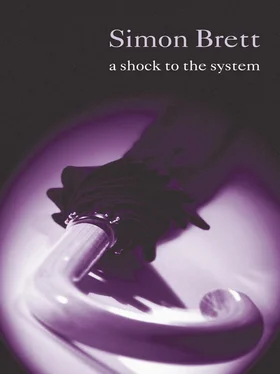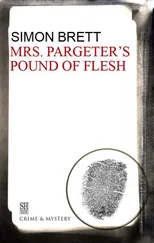Simon Brett - A Shock to the System
Здесь есть возможность читать онлайн «Simon Brett - A Shock to the System» весь текст электронной книги совершенно бесплатно (целиком полную версию без сокращений). В некоторых случаях можно слушать аудио, скачать через торрент в формате fb2 и присутствует краткое содержание. Жанр: Криминальный детектив, на английском языке. Описание произведения, (предисловие) а так же отзывы посетителей доступны на портале библиотеки ЛибКат.
- Название:A Shock to the System
- Автор:
- Жанр:
- Год:неизвестен
- ISBN:нет данных
- Рейтинг книги:3 / 5. Голосов: 1
-
Избранное:Добавить в избранное
- Отзывы:
-
Ваша оценка:
- 60
- 1
- 2
- 3
- 4
- 5
A Shock to the System: краткое содержание, описание и аннотация
Предлагаем к чтению аннотацию, описание, краткое содержание или предисловие (зависит от того, что написал сам автор книги «A Shock to the System»). Если вы не нашли необходимую информацию о книге — напишите в комментариях, мы постараемся отыскать её.
A Shock to the System — читать онлайн бесплатно полную книгу (весь текст) целиком
Ниже представлен текст книги, разбитый по страницам. Система сохранения места последней прочитанной страницы, позволяет с удобством читать онлайн бесплатно книгу «A Shock to the System», без необходимости каждый раз заново искать на чём Вы остановились. Поставьте закладку, и сможете в любой момент перейти на страницу, на которой закончили чтение.
Интервал:
Закладка:
He slumped against the wall with relief. It was all right. Merrily had tidied the shed. She had consigned the damning sherry to the dustbin and it was now lost and anonymous in some council amenity tip. Graham was safe. His late wife had obligingly destroyed the evidence against him.
He returned to the house for another large Scotch. That panic had passed, but other problems remained.
Whenever he was in danger of complacency, there was always the inquest to worry about.
It was a bad ten days.
Deaths generate work for the survivors. And the death of the active mother of two children generates more work than most. Though he had often castigated her minor inefficiencies, and though he had early recognised her native laziness, Graham was still surprised at how much Merrily had done, or perhaps by how much needed to be done by other people now that she was dead.
Unfortunately, the person who saw it as her God-given role to do most of these things was Lilian. Though Graham was glad of the help, he wished that it had come from another quarter.
Immediately after Merrily’s death, her mother had taken Henry and Emma to the custody of her flat, but as soon as Graham returned, they all came back to the Boileau Avenue house. Immediately Lilian took domestic control, and her approach had an unnerving air of permanence. Within three days she spoke of the spare room as ‘my room’ and by the end of the week was saying it would be more practical to sell her flat, ‘since I’m going to be needed here’.
This was not at all how Graham had visualised his future. If all his wife’s murder had achieved was to replace her with her mother, it had been a wasted exercise. Lilian around the house was even more annoying than Merrily. She hadn’t even her daughter’s minimal efficiency. Though she made much of dressing the part, with housecoats and turbanned scarves, her aptitude for housework was nil. Years of being cosseted by domestic staff and helpful lovers had left her without the basic skill of assessing a job and deciding how long it would take.
The kitchen floor would be left half-washed, two garments put in for a whole cycle of the washing machine, the Hoover would be abandoned half-way up the stairs, as Lilian launched herself into another scene.
Needless to say, her daughter’s death gave her full scope for drama. Her shock and misery were no doubt real, but through them Graham could detect a core of satisfaction, even of triumph.
Lilian knew that Merrily’s death had pushed her centre-stage and strengthened her power-base in the family. Her old complaint that no one needed her any more (though Graham had his doubts that anyone ever had needed her much), could no longer be justified.
But consciousness of her advantage did not stop the tears and the wailings and the scenes. She had lost her favourite daughter, she was alone in the world. Graham, now firm in his habit of objectivity, watched through these outpourings, feeling nothing but contempt. The situation could not continue for ever, but he would have to bide his time before he sought its solution.
His own behaviour he monitored with care. For him to appear unfeeling might raise suspicion, so he needed the occasional breakdown to maintain his image as the shocked and grieving widower.
In presenting this front he was helped by his panic over the inquest. The outsider only sees the physical manifestations of mental turmoil, not its cause. Hot flushes, sweating, restlessness, uneven speech patterns, sudden fluctuations of mood are all signs of a troubled mind, but the same symptoms could be triggered equally by the death of a much-loved spouse or the fear of being exposed as a murderer. Even through his anxiety, Graham could feel a perverse satisfaction that the cause of his discomposure could be so readily misinterpreted.
The inquest did worry him, there was no doubt of that. Though so much in the planning of the murder had worked in his favour, there were still too many variables about which he knew too little. How skilled was the police’s forensic investigation likely to be? Had he left some blatant clue to his sabotage? Was foul play suspected?
Occasionally confidence again flooded his being, but such moments of peace were rare. He worried that his preparations had not been sufficiently meticulous. If he ever committed another murder (and something told him that if he got away with this one, it was not impossible that he might) he would take a lot more care.
But never for a moment did he regret having killed Merrily. His anxiety was only about his chances of getting away with it. Her absence brought new inconveniences, but those could be resolved. He felt again that mixture of apprehension and excitement that had always preceded examinations at school. The inquest was his latest and most demanding test.
If he passed that one, nothing could stop him.
The inquest was not an isolated event; there were more police enquiries before the bereaved Marshall family and Lilian Hinchcliffe appeared in the Hammersmith Coroner’s Court. Graham underwent further meticulous questioning, which paradoxically he enjoyed. He had the feeling of being in a game, a quiz-programme perhaps, but one for which he had made adequate preparations and one which he stood at least a fifty/fifty chance of winning.
His daughter also, as discoverer of the body, suffered further questioning. The shock had told badly on her and in her emotion she became more of an adult. Not, though, the sort of adult who appealed to her father. She took on more and more of her mother’s mannerisms, which were of course Lilian Hinchcliffe’s mannerisms. As her grandmother’s influence grew, Emma became more like her. It was as if, with her daughter removed, Lilian immediately worked to replace her with another clone. Emma was fully recruited into the exclusive conspiracy of womanhood. The two now wept and emoted in unison.
Henry was apparently taking his mother’s death less hard. With the brutality of adolescence, he was even heard to make jokes about it. A psychologist might well have recognised this behaviour as a defence and discovered the suffering core of a bewildered child, but Graham was no psychologist and did not feel the interest to investigate.
With the frail link of Merrily removed, his children seemed more than ever strangers. Four of them sat side by side in the Coroner’s Court, but to Graham the others were irrelevant. He was the champion, in peak condition, though he still faced the most daunting challenge of his career.
The proceedings were short. The Coroner called a variety of witnesses. A doctor gave the evidence of the post-mortem on Merrily’s little body. A statement by Emma was read out. Lilian described her arrival at the house on Emma’s summons and the policeman, whom she in turn had called, stated what he had found. The electrician who had surveyed the house for rewiring confirmed his views of its lethal state. The Coroner regretted this terrible tragedy to a young family, spoke of the need for constant awareness of the dangers of superannuated electrical systems, and a verdict of accidental death was recorded.
Graham Marshall had cleared another huge hurdle.
The cremation had been set up in advance; only the Coroner’s verdict was required before the arrangements could proceed.
It was fixed for the following day. Lilian scoured the house for black and kitted out herself and the children like something from a Dickens serial on BBC-2. Graham wore a light suit and a black knitted tie. He tried to keep the bounce out of his step as he walked from the hearse to the crematorium chapel.
It was as he would have wished it. Clean, anonymous, functional. It reminded him of the hotel in Brussels where he had been only ten days before.
The officiating clergyman also achieved anonymity. His short address made no secret of the fact that he had never met Merrily. Her virtues were generalised, her identity withdrawn into platitude.
Читать дальшеИнтервал:
Закладка:
Похожие книги на «A Shock to the System»
Представляем Вашему вниманию похожие книги на «A Shock to the System» списком для выбора. Мы отобрали схожую по названию и смыслу литературу в надежде предоставить читателям больше вариантов отыскать новые, интересные, ещё непрочитанные произведения.
Обсуждение, отзывы о книге «A Shock to the System» и просто собственные мнения читателей. Оставьте ваши комментарии, напишите, что Вы думаете о произведении, его смысле или главных героях. Укажите что конкретно понравилось, а что нет, и почему Вы так считаете.












